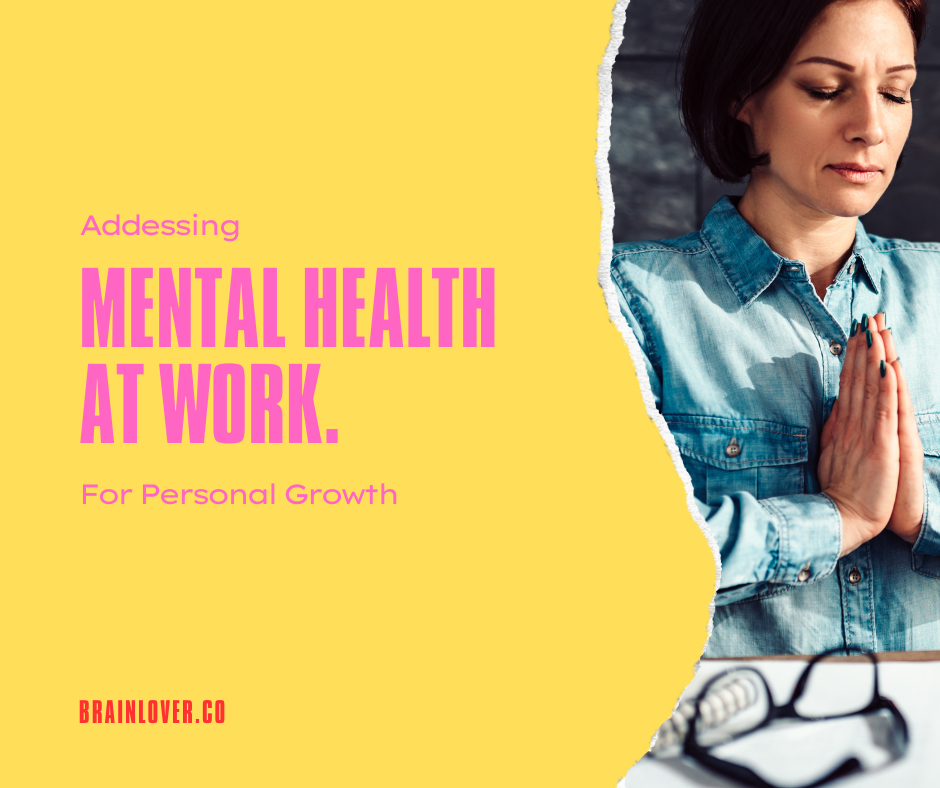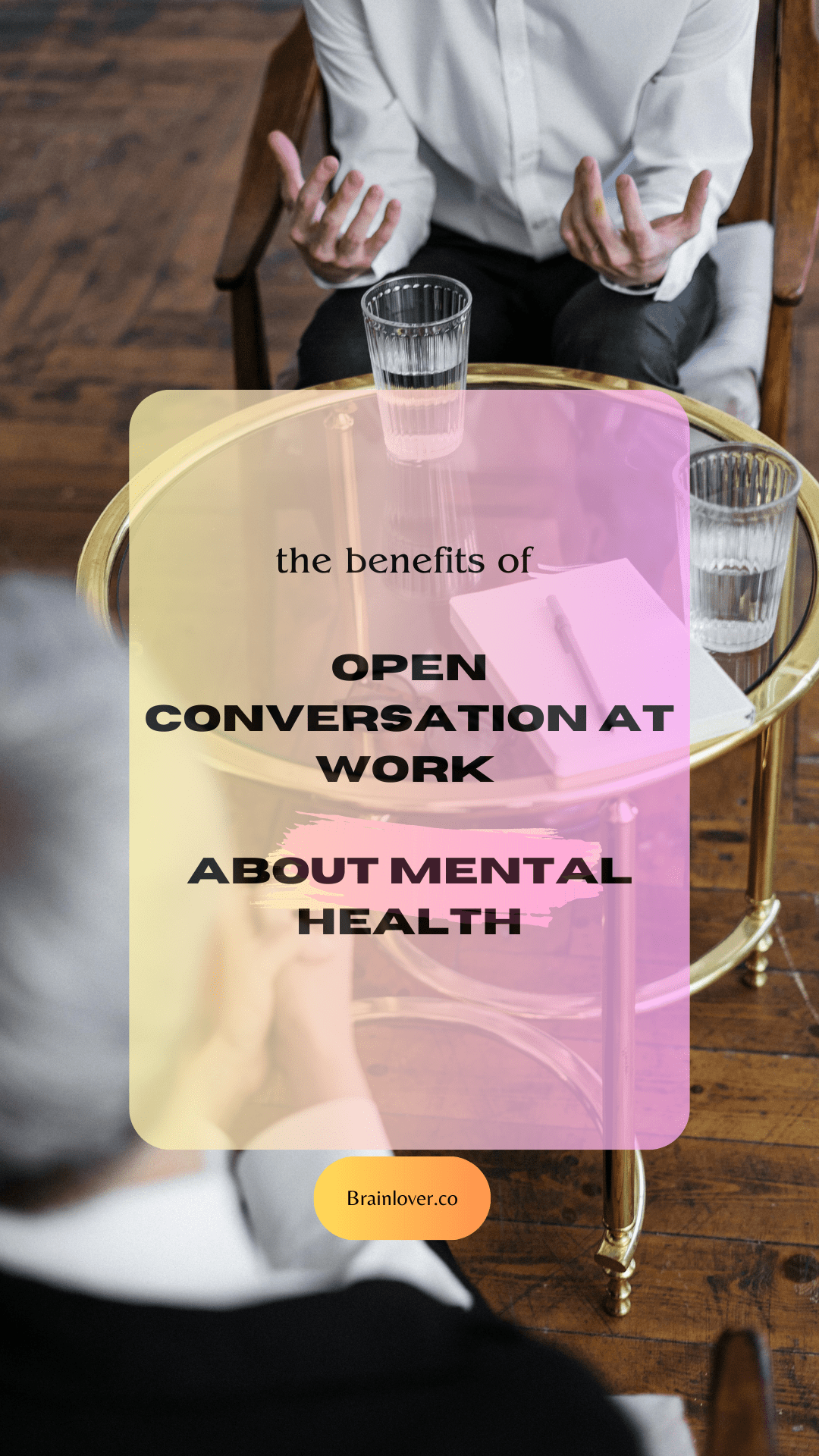Soothing Your Soul: Addressing Mental Health Awareness at Work for Personal Growth

Mental health awareness has become increasingly crucial in today’s fast-paced and demanding work environments.
As we navigate through the challenges of everyday life, it is essential to prioritize our well-being and seek support when needed.
Workplace stress, anxiety, and burnout are common issues that many individuals face, making it vital for employers to implement initiatives that promote mental health awareness and support in the workplace.
Addressing mental health in the workplace can create a more compassionate and understanding environment that nurtures personal growth and self-care.
Embracing Transparency and Open Conversations About Mental Health

In the workplace tapestry, where various threads of tasks and relationships intertwine, fostering an environment that champions transparency and open conversations about mental health is a beacon of hope and understanding.
This initiative is a crucial bridge, connecting the organization’s heart with its employees’ souls.
Employers can cultivate a culture of empathy and solidarity by carving out spaces where voices can echo without fear, and individuals can unveil their struggles and embrace vulnerability.
Encouraging employees to speak their truths about mental health challenges is not merely about breaking the silence but weaving a stronger, more connected community within the workplace.
When employers lead by example, showing that it’s okay but encouraged to discuss mental well-being openly, they light a path for others to follow.
This approach demystifies the complexities surrounding mental health, dismantling barriers and fostering a shared understanding that everyone’s mental health journey is valid and essential.
The magic of open conversations lies in their power to heal and unite. A profound sense of belonging emerges when individuals feel seen and heard in their struggles.
This collective embrace does more than support the individual; it elevates the workplace, turning it into a sanctuary of growth and compassion.
Through these dialogues, we confront the challenges head-on and celebrate the strength of vulnerability, creating an enduring legacy of mental health awareness that enriches the fabric of the workplace culture.
Providing Access to Mental Health Resources and Support
Navigating the complexities of our mental landscapes requires more than open conversations—it demands tangible support and readily accessible resources.
Employers can profoundly cast a lifeline to those adrift in turbulent waters by offering a comprehensive suite of mental health resources.
This lifeline could manifest in various forms, such as dedicated employee assistance programs that provide confidential counseling services or workshops that enlighten and educate on mental well-being topics.
In fostering a workplace that acknowledges and actively supports mental health, employers send a powerful message: “You are not alone.”
This commitment is a beacon, illuminating the path to wellness and assuring employees that their mental equilibrium journey is recognized and valued.
Investing in these resources signifies a profound understanding that employees’ mental health is intricately linked to the heart of the workplace’s success.
By integrating these resources into the workplace, employers can dismantle the barriers to seeking help, making the journey toward mental well-being less daunting.
The provision of these resources, tailored to meet the workforce’s diverse needs, encourages a culture where seeking support is not seen as a sign of weakness but as an admirable step towards personal growth and resilience.
In this nurturing environment, employees can thrive, propelled by the knowledge that their workplace prioritizes, cherishes, and protects their mental health.
Implementing Flexible Working Arrangements to Support Work-Life Balance

One of the most impactful threads in the quest to weave a tapestry of support and understanding within the workplace is the implementation of flexible working arrangements.
Recognizing the unique rhythms of each employee’s life, employers have the power to offer a compassionate and adaptive approach to work schedules.
This could include variable start and end times, the option to work remotely, or providing mental health days without deduction from the usual leave balance.
Such flexibility acknowledges the multifaceted nature of our lives, where personal responsibilities, health, and well-being dance in delicate balance with professional commitments.
Offering these adaptable arrangements sends a heartwarming message to employees: your well-being is paramount, and your professional life can be molded to harmonize with your personal needs and aspirations.
This understanding fosters a mutual respect and empathy culture, where employees feel genuinely supported and valued beyond their output or efficiency.
By embracing flexible working arrangements, employers cultivate an environment where stress and burnout are not inevitable outcomes of ambition but challenges that can be mitigated with thoughtful structure.
This enhances individual well-being and enriches the workplace’s collective spirit, making it a sanctuary of support and encouragement.
Here, employees are empowered to achieve their best in their careers and all aspects of their lives, contributing to a vibrant, thriving community anchored in compassion and understanding.
Organizing Regular Team-Building Activities and Mindfulness Sessions
Cultivating a spirit of unity and compassion within the workplace, regularly team-building activities, and mindfulness sessions serve as vital lifelines, connecting hearts and minds in the collective pursuit of well-being.
These gatherings are more than mere events; they are essential rituals that knit the fabric of our working community tighter, fostering an environment where mental health is not just a topic of discussion but a lived experience of care, understanding, and mutual support.
Through the gentle rhythm of mindfulness practices, individuals are invited to pause, breathe, and connect deeply with themselves and those around them.
These sessions offer a sanctuary from the whirlwind of deadlines and pressures, a sacred space where the mind can find peace and the heart can speak its truths.
In these moments of shared vulnerability and reflection, barriers dissolve, and a profound connection emerges—a reminder that we are not isolated islands but a vibrant archipelago of human experiences and emotions.
Team-building activities complement these reflective practices by weaving joy, laughter, and collective achievement into the tapestry of our work lives.
Through challenges and collaborative endeavors, employees discover the strength of their bonds and the power of their collective spirit.
These experiences underscore the value of each individual’s contribution, not just to the tasks at hand but to the overall atmosphere of support and encouragement that defines a healthy workplace.
Together, mindfulness sessions and team-building activities are the pillars of a culture of mental health awareness and personal growth.
They are the heartbeat of a workplace that cherishes each soul it shelters, nurturing a community where every member is empowered to soar.
Establishing a Mental Health First Aid Team Within the Workplace
In the heart of every organization lies the potential to foster a sanctuary for mental well-being, a potential magnificently realized through establishing a Mental Health First Aid Team.
This visionary initiative plants seeds of hope and healing within the workplace, offering a specialized cadre of compassionate allies trained in the nuances of mental health support.
These guardians of well-being stand ready to gently guide their colleagues towards the light of understanding and assistance, making the journey from struggle to strength a less solitary endeavor.
Forming such a team is a testament to an employer’s deep-seated commitment to nurturing an environment where everyone knows they are seen, deeply understood, and supported.
With their keen insight and training, these mental health first aiders serve as beacons, illuminating the path to professional resources and personal healing.
Their presence sends an unmistakable message: caring for your mental health is as natural and essential as breathing in our workplace.
Empowering a team dedicated to this cause elevates the organization’s collective spirit and weaves a more robust, more resilient fabric of mutual support and understanding.
This initiative boldly declares that mental health is a shared priority deserving of specialized attention and care.
Workplace stress reduction strategies

Workplace stress reduction strategies are pivotal for maintaining overall mental well-being.
Implementing such strategies creates a positive work environment and promotes productivity and employee satisfaction.
Essentially, this means that employers can create a happier, more productive workforce by addressing mental health and reducing stress in the workplace.
For instance, companies like Google and Zappos have integrated stress reduction strategies such as mindfulness training and wellness programs, reportedly increasing employee satisfaction and productivity.
Workplace mental health best practices
Workplace mental health best practices enhance employee well-being and fuel productivity and engagement.
These strategies necessitate a comprehensive approach considering work-life balance, employee recognition, and supportive management.
For instance, companies might institute flexible working hours or remote working policies to encourage a better work-life balance.
In addition, they could establish regular employee recognition programs or provide resources for effective communication between staff and management.
Here are some best practices:
* Implementing wellness programs that offer resources for stress management and mental health support could be beneficial.
* Cultivating an inclusive and stigma-free environment where employees feel comfortable discussing their mental health challenges can also improve workplace well-being.
Q&A
One in five adults in the United States experiences a mental health condition each year.
About 280 million people, or 5% of adults globally, have depression.
In 2022, 23.1% of U.S. adults (59.3 million) experienced a mental health condition.









